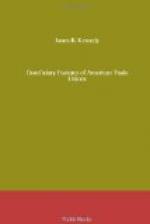The fund for paying the dues of unemployed members is supported by a weekly tax of one cent on each member. For 1898 the income of the out-of-work relief fund was $6,861.61, while the disbursements were only $1278, representing 7100 out-of-work stamps. In the whole period (1897-1907) since the inauguration of the out-of-work benefit, the revenue has more than sufficed for the disbursements. Although the 1899 convention transferred $10,000 of the surplus to other funds, on June 20, 1907, there remained in the fund the sum of $125,021, nearly twice as much as had been expended. The Union has not passed through a period of depression since the system was established, and the officers have insisted that wise policy requires the maintenance of a large reserve.[177]
[Footnote 177: Proceedings of Twenty-second Session, p. 646. In Supplement to Iron Molders’ Journal, September, 1902.]
The exemption of unemployed members from the payment of dues takes many forms. The Tobacco Workers’ Union provides that members out of employment shall be granted twelve weeks in which to pay dues before they may be suspended from the Union.[178] The Granite Cutters’ Association provides that any member in good standing and out of employment for two months or more shall be exempt from half of his dues.[179] The Brotherhood of Leather Workers on Horse Goods grants exemption from payment of dues for a period of thirteen weeks in any one year to unemployed members.[180] The Brotherhood of Locomotive Firemen provides that any member out of employment and unable to pay his dues or assessments shall not be expelled, and that the local lodge must pay his dues for one quarter. It is optional with the subordinate lodge as to whether or not it shall keep the member in good standing for more than one quarter.[181]
[Footnote 178: Constitution, 1900, third edition, 1905 (Louisville, n.d.), sec. 43.]
[Footnote 179: Constitution, 1906 (Quincy, n.d.), p. 45.]
[Footnote 180: Constitution, 1904 (Kansas City, n.d.), p. 22.]
[Footnote 181: Constitution, 1905 (Indianapolis, n.d.), sec. 195.]
The regulations enforced by the unions concerning the remission of the dues of unemployed members are less stringent than the rules governing the larger money out-of-work benefit. In the first place the period of good standing required before a member is entitled to assistance is shorter. A member of the Iron Molders is eligible to the benefit after six months of good standing. The Granite Cutters require only a two months’ membership.[182] Moreover, the rules as to registration are less strict. In the Iron Molders’ Union an unemployed member must report the date of the beginning of his idleness at the first regular meeting after he has been discharged and must report in person at every regular meeting of his local union; otherwise he cannot claim the benefit. The Leather Workers have the same provisions. The Tobacco Workers require idle members claiming indulgence in the payment of dues to report to the local financial secretary twice each week.[183]




